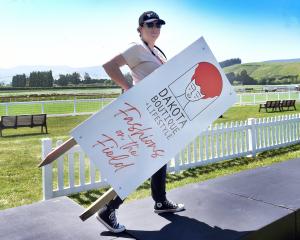Dunedin is set to ''explode with creativity'' after being named as a Unesco Creative City of Literature, Mayor Dave Cull says.
He said the designation recognised Dunedin's rich literary heritage and the ''wonderful'' writers working in the city.
The new status, announced in Paris on Monday night (NZ time), gave Dunedin the credibility to invite the biggest names in literature to the city.
Although the economic benefits would not be immediate, there would be ''rebound'' benefits over time, such as international collaborations between institutes like the University of Edinburgh and the University of Otago.
''It is hard to put a financial figure on that but having creative writers of any stature coming over here and interacting with our students, and our creative writing courses, has got to be great for everybody,'' Mr Cull said.
Although the council led the bid, Mr Cull expected a ''community-driven organisational trust'' to be created to cover costs associated with being a City of Literature.
As a first step, Dunedin would organise an international conference on literary culture.
Mr Cull expected writers to attend the conference in person or by video-conference.
Dunedin Writers and Readers Festival Trust chairwoman Alexandra Bligh said she hoped the designation would encourage international writers and audiences to visit Dunedin.
''Globally, it will raise the profile of Dunedin as a literary destination.''
Ms Bligh said she expected the designation to make it easier to attract international writers and bigger audiences to the festival, which would raise the profile of Dunedin writers.
She appreciated the council funding for past festivals but hoped it would give greater financial support to future festivals because of the delegation.
Council Arts and Culture group manager Bernie Hawke said he was ''absolutely delighted''.
Dunedin was one of the four newly designated Cities of Literature - the others were Grenada, Spain, Heidelberg, Germany, and Prague, Czech Republic, he said.
They join existing Cities of Literature Edinburgh, Melbourne, Iowa City, Dublin, Reykjavik, Norwich and Krakow.
He understood 16 other cities applied. The cost for the successful bid was unavailable, he said.
The announcement is the result of years of work from a steering committee, including Mr Hawke, bid co-ordinator Liz Knowles, writer and poet Annie Villiers and University of Otago design senior lecturer Dr Noel Waite.
Ms Knowles said she was ''still pinching myself'' about the honour.
She was excited at the prospect of sharing ideas with other creative cities.
Dr Waite said the benefits for Dunedin would be far-reaching.
''The university can use the status to attract and retain more national and international students, establishing connections and collaborations with the other 11 Unesco creative cities of literature,'' he said.
''From a business perspective, it will attract and catalyse more entrepreneurship in creative industries, and greatly enhance opportunities for literary and creative tourism experiences.''
University of Otago Vice-chancellor Prof Harlene Hayne said the status would have ''far-reaching benefits'' for Dunedin and the university.
''I'm confident that for both our university and the city this is the beginning of even greater things,'' Prof Hayne said.












